- Home
- Diana Wynne Jones
Black Maria Page 6
Black Maria Read online
Page 6
She gave a sunny smile and shook her head. “No. It came from Bond Street in London. It’s ever so expensive. You couldn’t afford it, dear.”
“I come from London,” I said. “Do you live here, miss?” I was practically lisping. She must have thought I had no brain at all. “You’re ever so pretty. What’s your name?”
She liked me thinking she was pretty. She gave a pleased wriggle and quite a sweet smile. “My name’s Zenobia Bayley,” she said. “I live here and I have to go home now.” And she started the car and drove it away down the street.
I started to give her a sickly little goodbye wave, then gave it up. It had gone boring again, like the orphanage. It wasn’t our car. She wasn’t Verena Bland. And Mum was pounding up from the other direction with the cat food and the new skirt, saying, “Mig, for goodness sake! Don’t just go away and leave things like that! What were you doing?”
“Being a moron,” I said. And I still think it was our car. I can’t seem to shake myself out of it. Chris says that if it was – and he thinks it isn’t – there are perfectly reasonable explanations. The insurance wrote it off and sold it, and the scrapyard found it worked and mended it, and then sold it to Zenobia. Then why did they change the number plates? Because it isn’t our car? Oh, I give up.
Chris is in a bad mood anyway. It was a mistake to leave him with Aunt Maria and the Mrs Urs. He said Something Awful again. Nobody would say what, though. Aunt Maria would only keep saying, “I’m so hurt and ashamed. But I forgive him of course.” Then she says gently, “I shall pray for you, Christopher.” It’s a wonderful way to annoy Chris. He hates being given the wrong name, but he hates even more having to say his name is really Christian. If he tries, he has to shout, “CHRISTIAN!” at the top of his voice because Aunt Maria goes deaf on the spot.
Mum said Chris had been punished enough and, late at night, she got it out of Chris what he had done. It seems that mad Zoë Green had been one of the people who came for tea. All the other people there whispered warningly to Chris that he was to be nice to Zoë Green because of her son. “All I did,” Chris said innocently, “was ask what was wrong with her son.”
“Oh, did you?” said Mum. “I know you, Chris. I can just hear you doing it. ‘But what’s wrong with her son? Is he dead? Is he in prison for murder? Is he a sex maniac?’ Louder and louder, until they could probably hear you at the town hall. I can see the look on your face while you did it too. Don’t do it again.”
Mum was right. Chris went red and muttered, “Well, it had to be something like that, or she wouldn’t have gone dotty, would she?”
Since then, Mum has kept announcing that Chris needs fresh air. She sends him out in the morning whenever she sees him alone in the room with Aunt Maria. She sends him out in the afternoon as soon as the Mrs Urs start arriving. Chris doesn’t mind. But I do. I have to be “dear little Naomi” and listen to the Mrs Urs telling me how much Chris is upsetting Aunt Maria. “You know how sensitive she is,” they say. “The least thing makes her so ill.” Except for Elaine. Elaine just said bluntly, “I told you to stop that brother of yours. You’d better try.”
I tried to defend Chris by saying he didn’t understand old ladies.
Elaine fixed me with her fanatical eyes and grimmest look. “Oh yes, he does understand,” she said. “He knows just what he’s doing. And it won’t work. Not here. Not now.” Then she added, over the shoulder of her black mac as she marched out, “It’s a pity. I like him, you know.”
The funny thing is that what Elaine said is true. I think she does like Chris, and I think Chris is up to something. I am the one who doesn’t understand. I realised this when we went to see Miss Phelps this morning. I went with Chris because Mum had got sick of me complaining that Chris got all the fun.
“It won’t be fun,” Mum said. “She’s a poor old lady and I want you to find out if there’s anything we can do for her. You can try and stop Chris being rude too, if you can – though I know that’s the same as asking you to keep the sea back with a broom.”
So we crossed the street to Number Twelve, Chris and me. Its lace curtains twitched like lace curtains in a panic when we knocked at the door. We stood there so long that we thought no one was going to open the door at first. When Miss Phelps did open it, we both stared.
“Oh, good morning. Chris and Mig, I believe,” she said. She looks just like a gnome. She is tiny, much smaller than me, and she has a hump. Her eyes sort of slant in her withered face – and the glasses she wears sort of slant with her eyes. You can see she can hardly walk. She holds on to things and shuffles. But there is nothing wrong with her mind. She is brisk and direct and – well, the best way to put it is that she is interested in things and people for their own sake. She does not want to make anyone do anything. You can’t imagine how restful that is after Aunt Maria.
Somehow all that came over just from the way she said “Good morning”. Chris stopped looking long-suffering and gazed down at her with the same interest she was using on us. “Mum sent us over to see if there was anything you needed,” he said.
“How kind of her,” said Miss Phelps. “No, I can’t say I have any crying need – except perhaps for better legs. But won’t you come in? Word gets round in a place like Cranbury, you know, and I’ve heard a lot about you.”
We went in, feeling a bit shy, into a long hall. There was an extraordinary noise coming from somewhere. It went thump, bump, and then a desperate voice cried out, “Aaaah!” as if someone was being killed. It startled me a lot until I remembered there were such things as television sets. I’ve been such days without a telly now that I’ve forgotten the sort of noises they make. I thought, Oh good! We’ve come into a normal home!
“Go down the passage, then through the door on the right,” Miss Phelps said. She shuffled after us explaining, “I go rather slowly because I have a way of falling over. The doctor can’t understand it. He calls it The Plunge.”
It was a very ordinary room, with a plain sofa and a special high chair near the window with a table across it. We sat down on the sofa, facing the telly. The telly was off. Funny, I thought. Miss Phelps shuffled to the high chair and nipped up into it like a monkey or a small child. She has a perfect view of the street from there. She must watch us go in and out all day, perched in her chair like a gnome.
“No, I read a lot too,” she said, knowing what I was thinking. “I generally keep out of my neighbours’ business, and out of quarrels, too, if I can. I like to stand aside.”
“But you said something to Aunt Maria,” Chris said.
Miss Phelps chuckled. “Yes, didn’t I just!” she said. “But it was a perfectly objective general remark, which I don’t intend to repeat to you two. It was after she got rid of poor Lavinia.”
“Lavinia’s gone to her mother – hasn’t she?” I said.
“Wherever it is, I think you’ll find she’s gone for good,” Miss Phelps said. “Now what do you both think of Cranbury?” She made us talk about Cranbury for quite a while. We didn’t say what we really felt, exactly, and Chris was surprisingly polite, but she knew what we meant.
“In other words, it’s a hole,” she said. “It’s a very healthy hole, you know. People live to a surprising age here, but there isn’t much to offer children out of season, I do agree.”
Chris seemed to have been waiting for her to say something like this. He said, “What happened to Zoë Green’s son?”
Miss Phelps turned in her high chair and looked at me. Then she turned herself to look at Chris. “You won’t find that anybody speaks about him,” she said. “Now I think I shall make you talk about London.”
Chris said, “But I want to know. How long ago was it – whatever it was?”
“That I can’t tell you,” said Miss Phelps. “And I do like to hear about London, you know. As I said, few people talk about Antony Green. In fact, almost the only person who does is my brother. You’ll want to speak to my brother, I suppose?”
“Yes please,” said Chr
is. “Where—?”
“Come this way then.” Miss Phelps climbed down from her chair and shuffled to the door. She opened it and shuffled across the hall, where she opened another door, while we both stood towering over her wondering what was inside. She turned round. “Do go in,” she said, and she stretched her arm out to usher us in. At least, I think that was what she meant to do. But her arm seemed to take the rest of her with it. As we went into the room and found it almost bare, except for a man in a dressing-gown standing like a statue and holding a sword pointing towards us across the top of his own head, Miss Phelps’s gnome-like body swooped through the air in a graceful curve. Then she fell with a crash on the bare floor. It looked almost as if she had forgotten how to fly.
Chris and I both said, “Oh dear!” and “Are you all right, Miss Phelps?”
The man with the sword never moved. He said irritably, “Not again, Amaryllis!”
“Yes. It’s The Plunge today,” Miss Phelps said, a bit breathlessly. She didn’t try to get up. She just lay on the floor and said politely, “My brother Nathaniel. Christian and Margaret Laker, Nathaniel.”
We stared from Miss Phelps on the floor to Mr Phelps with his sword. He was the man who had said, “Good afternoon,” on the sea front the day Chris told me about the ghost. He has white hair and a white moustache and a thin, angry face. He said, “The art of swordsmanship, properly practised, entails me standing here for another minute.”
“By which time any self-respecting enemy will have stabbed you in the stomach,” Miss Phelps observed, still lying on the floor.
“Oh, pick her up, can’t you!” Mr Phelps said angrily.
We got down and sort of crawled round Miss Phelps. But she said, very politely, “No, thank you. I think I shall lie here until I notice what I’ve broken this time.”
So we got up again, feeling very silly. I stared at Mr Phelps’s long mauve ankles under his dressing-gown and then at his sword. Chris sort of cleared his throat.
Mr Phelps said, “What in the world do you mean, bringing me two of the enemy?”
“They aren’t the enemy,” Miss Phelps said, lying there. “I checked.”
“They’re from Number Thirteen,” said Mr Phelps. He bared his teeth and stared up at his sword.
“We hate Aunt Maria as much as you do,” I said.
“I doubt it,” said Miss Phelps from beside my feet.
“I want to know about Antony Green,” Chris said.
“What about him?” said Mr Phelps. He lowered the sword at last, very slowly, and stood looking along it as if he thought it might have got bent.
“How long ago?” Chris said. “And – what happened?”
“How long?” asked Mr Phelps, frowning at his sword. “Twenty years, I think. That’s all I’m prepared to say until I know your motives, young man.” He began making lunges with the sword, stamping with his slippers on the floorboards and going “Aah-ah” when he stamped. That was the noise I thought was the telly. It must have been very uncomfortable for Miss Phelps on the floor.
Chris edged round past Miss Phelps’s little goblin body until he was dangerously in the way of the sword, where he tried to catch Mr Phelps’s frowning eyes. “There’s a ghost in my room, sir,” he said.
Mr Phelps stopped with one foot about to stamp. He lowered his sword and his slipper and stared at Chris. “Why didn’t you say so before, boy?” he said. Then he suddenly rounded on me. “Get her up, get her out of it,” he said, pointing at Miss Phelps with his sword. “All women out of here.”
Miss Phelps said, “I think I’m ready to stand up now.” I bent down and heaved at her. She was so light. She came up as if she was floating, and she was so dignified that I had to let go of her as soon as her feet were on the floor. “Thank you,” she said, shuffling into the hall. Then when we got to the other room, she said, “Do you know that was a good fall! Nothing broke this time.” Then she sat in her chair and made me tell her all about London for nearly half an hour, until Chris had finished talking to Mr Phelps.
Elaine was right. Chris came out looking pretty thoughtful and he wouldn’t tell me what Mr Phelps said. “Not your business, Mig,” he said.
“Not in front of women and children, you mean!” I said crossly.
“That’s roughly it,” Chris said.
Sometimes I think everyone in Cranbury is mad, even me.
CHAPTER FIVE
It got madder yet. Perhaps Aunt Maria is the Hatted Queen of Cranbury because she’s Queen of Mad Hatters. She knew at once that we had been to see Miss Phelps. “Such a quaint little thing, isn’t she?” she said. “I always try to be kind to her, but she makes it so difficult. I expect you found her very hard to talk to.” Aunt Maria looked down at her lap, the way she always does when she thinks she is forced to say something terrible, and added, “So uncharitable!”
Chris gave me an expressive look. I said Miss Phelps had fallen over.
“Poor thing!” Aunt Maria said. That was her special sincere voice. “That will teach her to make rude remarks. Well, you won’t be going there again, so that’s all right.”
Elaine came marching in to tell us the same thing after lunch, when Chris and I were washing up. “You two,” she said. “Cut the Phelps connection – understand? We don’t have anything to do with Number Twelve.” And before Chris could think of a rude remark, Elaine went off up the garden, where Mum was petting the cat and pretending to garden. The cat hid, and Elaine strode around forbidding Mum to let us go near Miss Phelps. Then telling Mum she had done a good job on the roses but she ought to tackle some more of the weeds before they started growing – on and on, until I wondered why Mum didn’t hit her. Chris says he wouldn’t dare hit Elaine, either. She’s so tall and wiry. But I saw Mum go for Dad several times when Dad was trying to hit Chris or me. Mum’s brave enough. But she’s just too civilised to hit Elaine.
This is what puts Mum at a disadvantage. Aunt Maria and Elaine – and some of the Mrs Urs – can rely on Mum being too civilised to fight back. What’s the good of being civilised, that’s what I want to know? It just means other people can break the rules and you can’t.
Anyway, I tried to break the rules when all the Mrs Urs came to tea. It’s not as easy as you’d think. There were seven of them, so there was a crowd in the dining-room and not enough cake for me. Chris had taken a huge slice in his pocket when Mum booted him out. I was squashed between Hester Bayley and Phyllis Forbes, but that didn’t stop the other five leaning over and telling me:
1. “Naomi, dear, we don’t like to think of you under bad influence.”
2. “Naomi, dear, I heard something about you I hope isn’t true.”
3. “Naomi, dear, don’t worry your aunt this way.”
4. “Naomi, dear, I was so sad to hear you saw Miss Phelps.”
5. “Naomi, dear, Miss Phelps isn’t a nice person to know.”
6. This was Phyllis Forbes. “She’s all right, but her brother!”
First I tried saying in a loud voice, like Chris had, “What’s wrong with Miss Phelps?” And only Aunt Maria seemed to hear at all.
“What’s wrong with home helps?” says Aunt Maria. “Dear Lavinia! I hadn’t a word to say against Lavinia. Devoted.”
So then I pulled Phyllis Forbes’s sleeve and asked how the orphans were getting on. I said, “Those dear little children you look after—”
She just turned away. She never talks about the clones. That’s why I asked.
So that left Hester Bayley. Sensible, ordinary-looking Hester Bayley who gave me those pictures. I said, “Do you have a daughter called Zenobia, Mrs Bayley?”
“Yes, as a matter of fact I do,” she said in her sensible way. Then, just as I began to feel interested, Hester Bayley held her hand out to show someone about two feet high. “About this tall,” she said. “A sweet child, vibrant with imagination. What a pity,” she said, giving me one of her most sensible smiles, “that such a daughter only exists in my imagination.”
“We
ll,” I said, “I suppose an imaginary daughter’s better than none.”
“I do agree,” she said. I think she’s even madder than Zoë Green.
And Mum seems to have caught it now. She smuggled the grey cat up to our bedroom. It wasn’t hard to do. For one thing, the cat seemed to be expecting it. When I opened the front door to put the milk bottles out, the cat was sitting on the doorstep like a hassock escaped from church. It simply strolled indoors, tail up, cool as if it owned the place. Mum called to Chris to turn the electricity off, snatched the cat up and raced upstairs so fast that her candle went out.
She was feverishly fumbling about trying to light the candle again when I came in with my candle. “Oh good! Light!” she said. She snatched my candle and nearly put that out, too, lighting hers with it. Then she rushed to the shelf and took down Lavinia’s silver-framed photo of Lavinia and her mother. “That’s it!” Mum cried, and shoved candle and photo towards me. “Don’t you think she’s the spitting image of Lavinia?” she cried.
“Lavinia’s mum?” I said. “Yes, I told you. Twins.”
“No, no!” cried Mum. “The cat, Mig!”
Naturally Aunt Maria woke up and shouted, “Is there a bat? Has a bat got in the house?”
I looked at the cat. It was lying on my pillow looking even more than usually like a pyjama case. It looked calmly back at me.
“It’s all right, Auntie!” Mum called. “I just said I was getting fat! ”And in a whisper to me, “Isn’t it like her?”
“Yes, you’ll need a hat for church tomorrow, dear!” called Aunt Maria.
“And a sprat on a mat where I spat,” says Chris on the stairs listening in.
“What’s that? ”yells Aunt Maria.
By this time I’d got the giggles and Mum was looking tragic and misused. I said hurriedly that the cat was probably exactly like Lavinia. Mum relaxed. Chris went to bed and Aunt Maria went back to sleep. “Why are you so worked up about what the cat looks like?” I said.

 Fire and Hemlock
Fire and Hemlock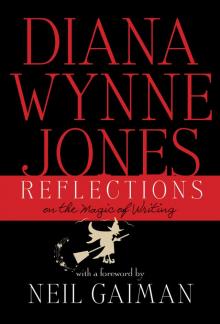 Reflections: On the Magic of Writing
Reflections: On the Magic of Writing The Game
The Game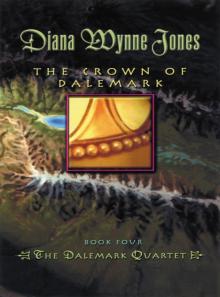 The Crown of Dalemark
The Crown of Dalemark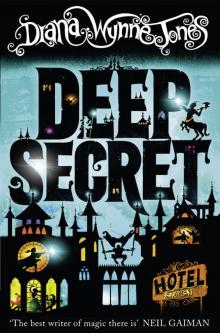 Deep Secret
Deep Secret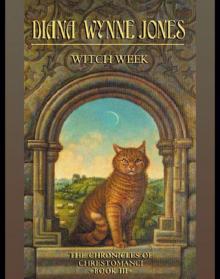 Witch Week
Witch Week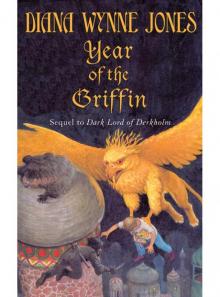 Year of the Griffin
Year of the Griffin Wild Robert
Wild Robert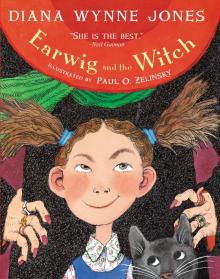 Earwig and the Witch
Earwig and the Witch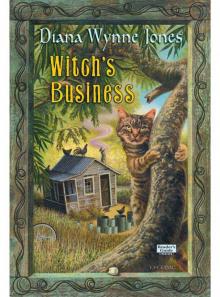 Witch's Business
Witch's Business Dogsbody
Dogsbody Caribbean Cruising
Caribbean Cruising Cart and Cwidder
Cart and Cwidder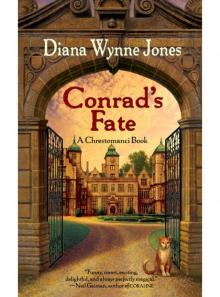 Conrad's Fate
Conrad's Fate Howl's Moving Castle
Howl's Moving Castle The Spellcoats
The Spellcoats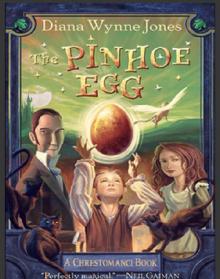 The Pinhoe Egg
The Pinhoe Egg Drowned Ammet
Drowned Ammet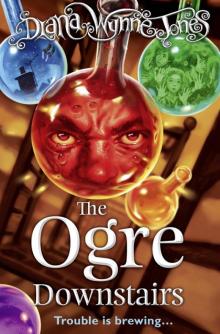 The Ogre Downstairs
The Ogre Downstairs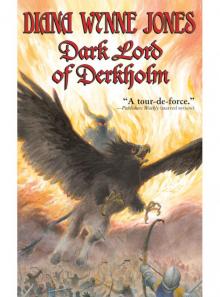 Dark Lord of Derkholm
Dark Lord of Derkholm Castle in the Air
Castle in the Air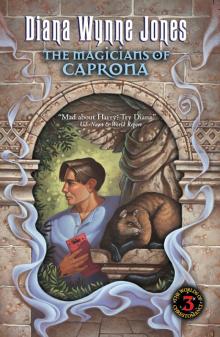 The Magicians of Caprona
The Magicians of Caprona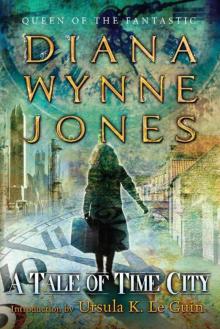 A Tale of Time City
A Tale of Time City The Lives of Christopher Chant
The Lives of Christopher Chant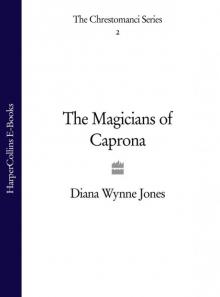 The Magicians of Caprona (UK)
The Magicians of Caprona (UK)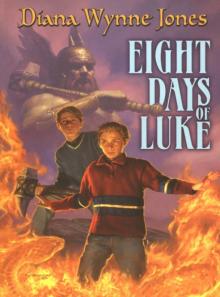 Eight Days of Luke
Eight Days of Luke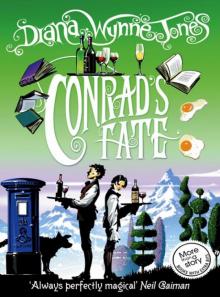 Conrad's Fate (UK)
Conrad's Fate (UK)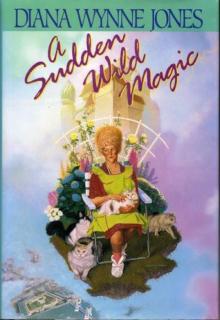 A Sudden Wild Magic
A Sudden Wild Magic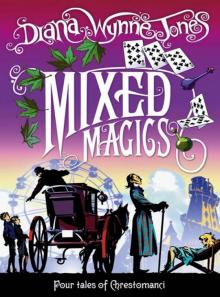 Mixed Magics (UK)
Mixed Magics (UK)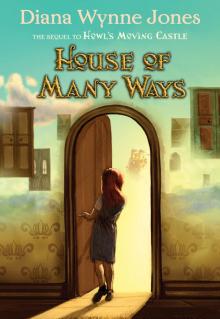 House of Many Ways
House of Many Ways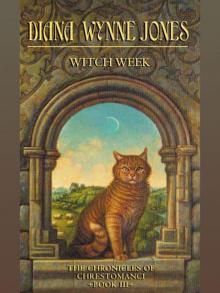 Witch Week (UK)
Witch Week (UK)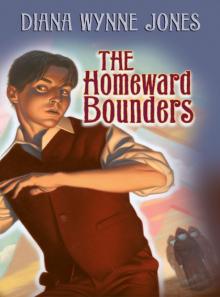 The Homeward Bounders
The Homeward Bounders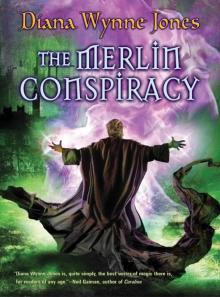 The Merlin Conspiracy
The Merlin Conspiracy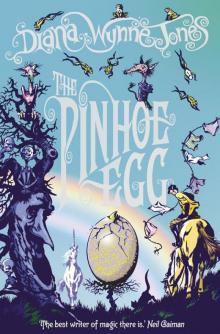 The Pinhoe Egg (UK)
The Pinhoe Egg (UK)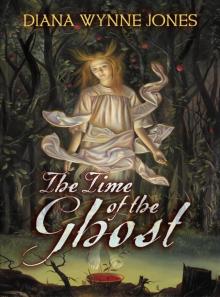 The Time of the Ghost
The Time of the Ghost Hexwood
Hexwood Enchanted Glass
Enchanted Glass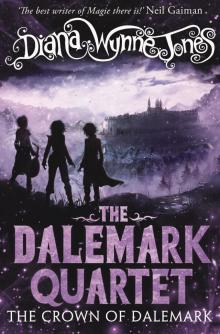 The Crown of Dalemark (UK)
The Crown of Dalemark (UK)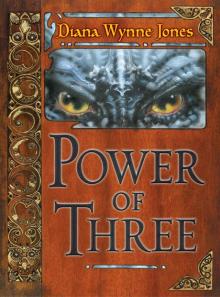 Power of Three
Power of Three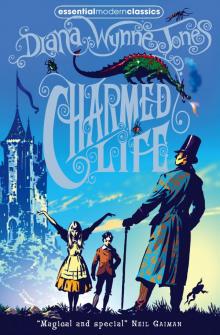 Charmed Life (UK)
Charmed Life (UK)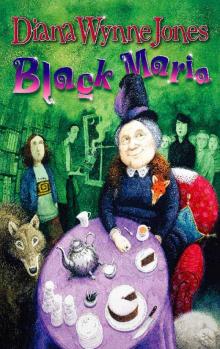 Black Maria
Black Maria The Islands of Chaldea
The Islands of Chaldea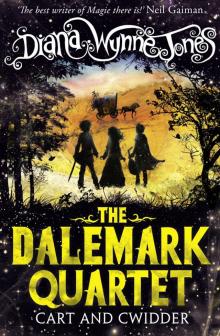 Cart and Cwidder (UK)
Cart and Cwidder (UK)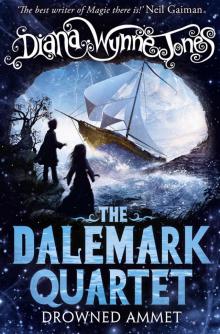 Drowned Ammet (UK)
Drowned Ammet (UK) Charmed Life
Charmed Life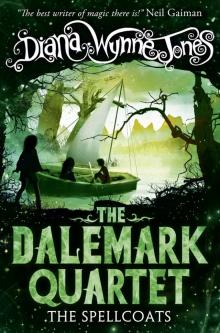 The Spellcoats (UK)
The Spellcoats (UK)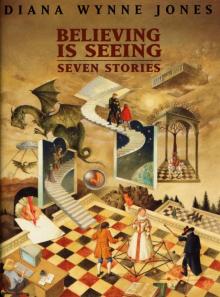 Believing Is Seeing
Believing Is Seeing Samantha's Diary
Samantha's Diary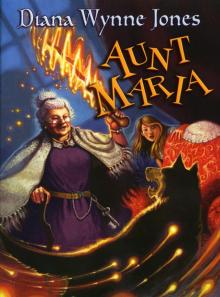 Aunt Maria
Aunt Maria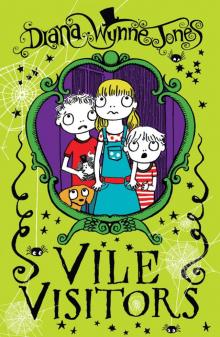 Vile Visitors
Vile Visitors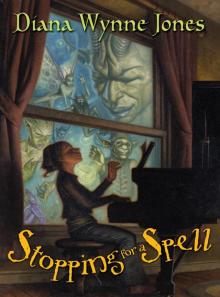 Stopping for a Spell
Stopping for a Spell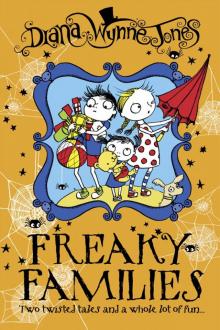 Freaky Families
Freaky Families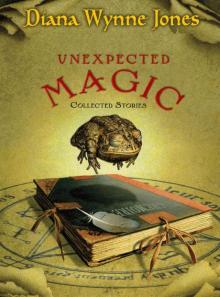 Unexpected Magic
Unexpected Magic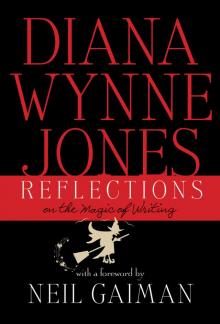 Reflections
Reflections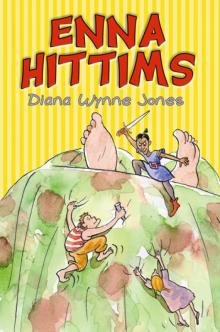 Enna Hittms
Enna Hittms Mixed Magics: Four Tales of Chrestomanci
Mixed Magics: Four Tales of Chrestomanci